Gutters are a humble but essential part of your home’s defense against the elements. They prevent damage to your exterior walls, foundation, and landscaping. To keep them functioning, though, they need regular cleaning to get rid of accumulated leaves, gunk, and sometimes ice. It’s not that hard, but because it usually involves getting up on a ladder, it’s one of the most dangerous home maintenance tasks you can do. Every year 164,000 people go to the emergency room after falling off a ladder, and 300 people a year die from falls like that. It’s dangerous even for professionals. The leading cause of death for construction workers is falling from a ladder. We want to share some of the safest ways to clean your gutters so you don’t become one of those statistics.

©Visivasnc/iStock via Getty Images
Ladders kill, even construction workers. This guy needs to watch his back!
What Happens if You Don’t Clean Your Gutters?
Have you ever taken a walk in a suburban neighborhood and seen clusters of tree seedlings sprouting in a house’s gutters? It’s a sure (and embarrassing) sign someone has gotten behind on their maintenance! But what difference does it really make? Aside from the fact that your roof will collapse if you let a forest keep growing on it, here’s why you should clean your gutters:
Structural Damage
Gutters channel rainwater away from your house. If they’re clogged with leaves, debris, or ice, rain or snowmelt can back up on the roof and hundreds of gallons of water around your foundation. You could have water damage to your roof, interior or exterior walls, or foundation. If you’ve got a leaky basement, this can cause expensive flooding.
Landscaping Damage

Meticulous landscaping can be ruined if your gutters aren’t channeling rainwater away from your house.
©Naratat Wongapai/Shutterstock.com
Overflowing gutters can pour gallons of water into your carefully tended shrubs and flowers. The swampy morass can rot their roots, promote the growth of mold and mildew, and become a breeding ground for mosquitoes, gnats, and other pests.
Fire Hazard
Is your house in an area prone to wildfires? Do your neighbors ever set off a 4th of July firework, have a barbeque, or a backyard fire pit? Do you ever use a wood-burning fireplace in the fall? The wind can take a stray spark from any of these and burn the house down by igniting dry leaves and sticks in your gutters.
A Vermin Breeding Ground

Destructive wildlife can be attracted to your roof if your gutters are not kept clean.
©Nico Giuliani/Shutterstock.com
Leaf debris, sticks, fallen nuts and seeds, and standing water provide everything a pest could want. Mosquitos, wasps, chipmunks, mice, squirrels, and birds will feel like you laid out a buffet for them. Undetected they can make their way through cracks or burrow a hole right through the wall and make their home in your walls or attic.
Treacherous Ice
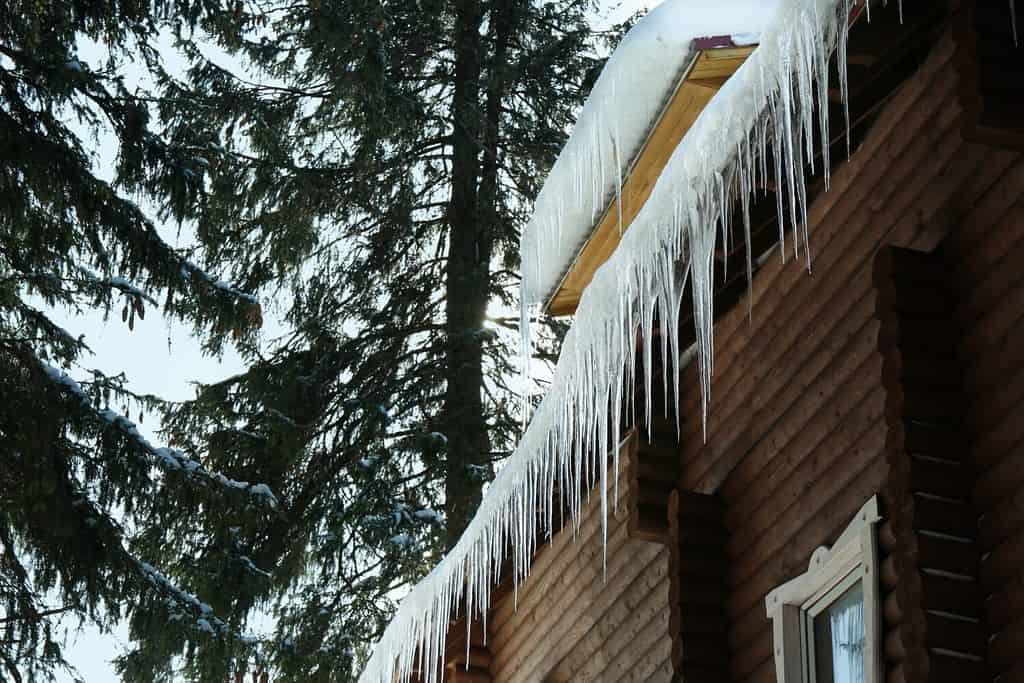
Overflowing gutters can create ice hazards on and around a home.
©New Africa/Shutterstock.com
Water overflow from gutters can make dangerous icicles and continuously frozen patches on your driveway or sidewalk. You’ll spend the whole winter chipping away at that icy spot, spreading ice melt on it, and carefully walking around it.
Declining Property Value
Well-maintained, gutters should last about 20 years. Gutters weighed down with gunk or ice can bend and pull away from the house. Overflowing gutters can get covered in hard-to-remove dirt stains and might need to be replaced earlier. Obviously, all of this reduces your home’s curb appeal and starts to give the neighborhood a neglected appearance.
How Often Should You Clean Your Gutters?
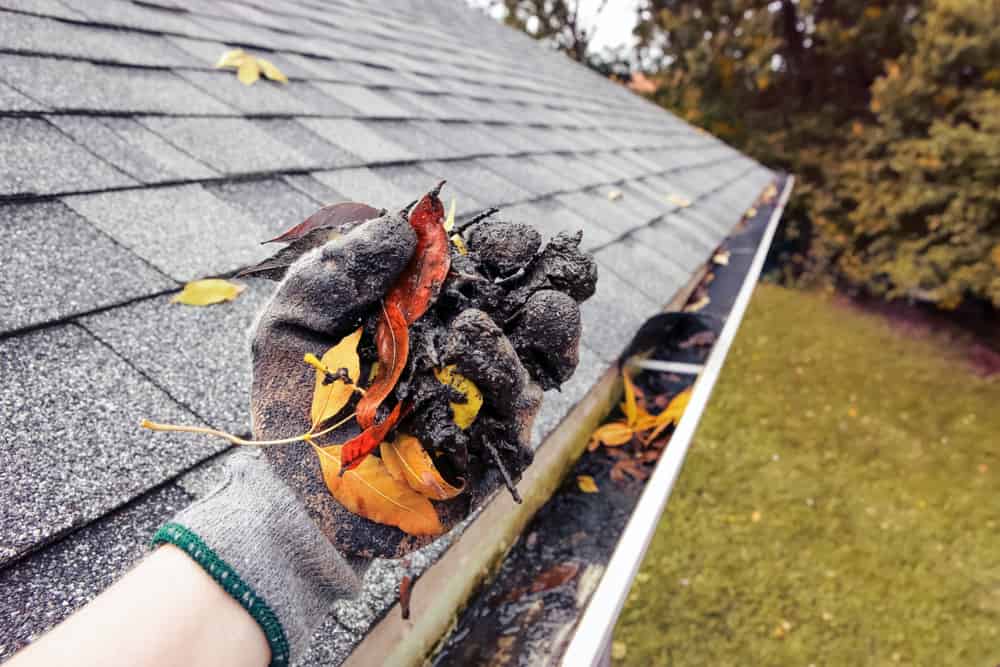
Most experts suggest cleaning your gutters at least twice a year.
©Suzanne Tucker/Shutterstock.com
Quite a few homeowners don’t think about cleaning their gutters until they are overflowing or they see visible sticks and debris hanging out of them. Most experts would recommend cleaning them at least twice a year, in spring and fall. It really depends, though, on the climate where you live and how much foliage you have around your house. A house in Arizona landscaped with rocks and cacti will need less attention to this issue than one in Vermont in a grove of towering maple trees.
If there is a lot of foliage around your house in a temperate climate, plan your two annual cleanings strategically. In autumn, wait until all the leaves have dropped and in spring, wait until trees have finished blooming and seeding. Maple “helicopters” and cotton “fluff” can undo a lot of your hard work. Your gutters might also need an additional spot-cleaning in winter to clear ice dams.
What Are the Safest Ways to Clean Your Gutters?
We’ve collected these safe gutter-cleaning suggestions for you from people who know, sometimes through hard personal experience!
1. Hire a Professional
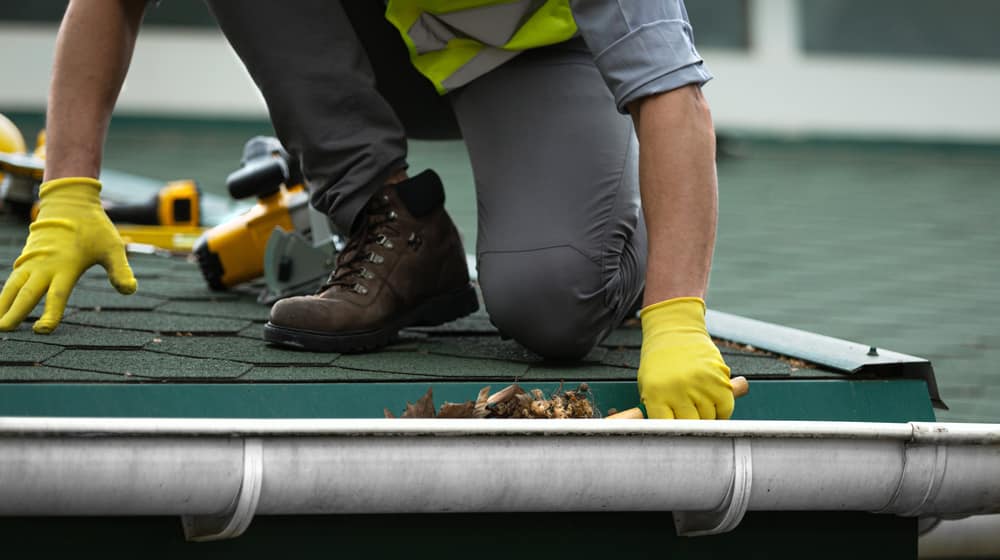
Professionals have the tools and skills to clean your home’s gutters safely.
©Billion Photos/Shutterstock.com
The safest way to do a dangerous job is . . . not to do it. Professionals have the proper tools and experience to clean your home’s gutters safely and efficiently. And let’s face the uncomfortable truth, they are often physically better able to work from a ladder than those of us who live our lives behind a computer monitor.
Remember, hiring a professional means hiring a professional, not giving $20 bucks to the neighbor’s teenager to do it for you. If that kid falls off the ladder, you could be liable. On average, professional gutter cleaning can cost $70-$400 depending on the size of your home and the number of stories (hence, the height and danger of the ladder!). A cleaning company should carry its own insurance and be responsible for any injuries or damage to your property. And the expense is much cheaper and less painful than your recovery from a nasty fall.
2. Keep Your Feet on the Ground
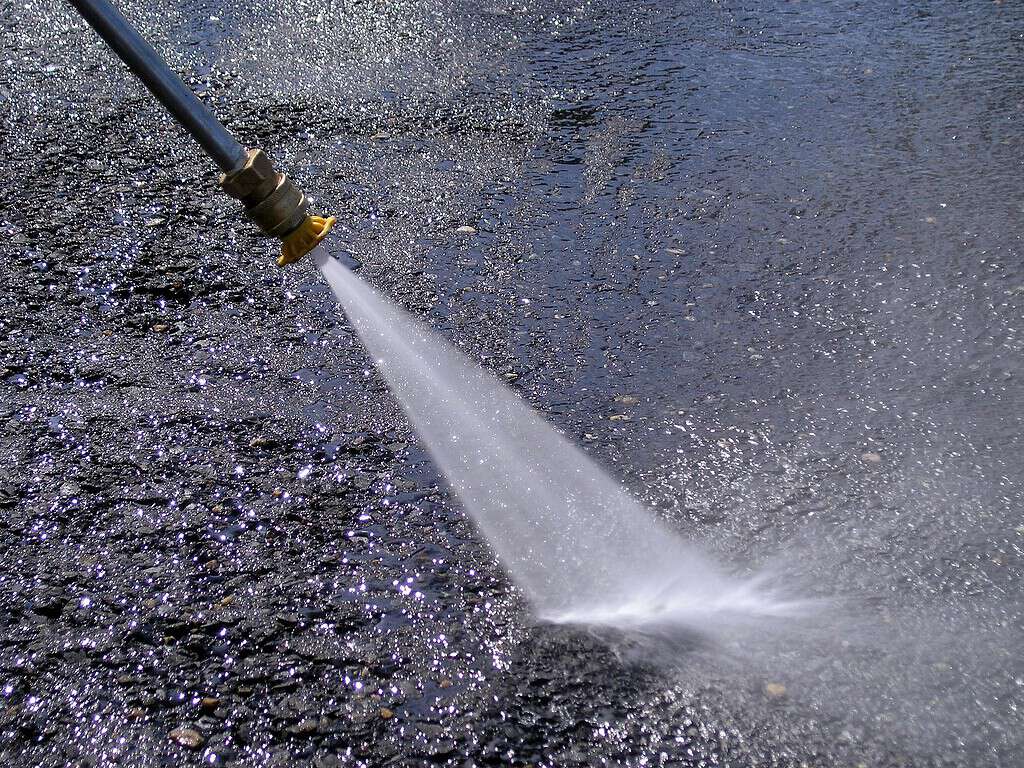
A pressure washer with a long wand can help you avoid setting foot on a treacherous ladder.
©I, Mschel, CC BY-SA 3.0 , via Wikimedia Commons – Original / License
If your roof isn’t too high and the roofline isn’t too complicated, you might be able to accomplish this chore without setting foot on a ladder. You could rent or purchase a power washer with a long wand. Telescoping wands can range from 6-24 feet to give you the reach you need. Of course, you won’t be able to see what you’re doing up there, but when no more debris is flying out and clear(ish) water is running freely through the downspouts, you’ll know you have achieved your purpose.
3. Observe Ladder Safety
If you’re intent on doing this yourself and can’t reach the gutters without a ladder, follow these ladder safety tips:
- Use a sturdy ladder with the correct height and load capacity.
- Make sure it is long enough. You should never use the top 3 feet of a ladder, nor stretch out from it to reach what you need.
- Make sure it is working properly and doesn’t have any damage such as loose screws or bolts, or loose, mud-caked, or greasy rungs.
- Set up the ladder on a level surface with the base 1 foot away from the wall for every 4 feet of height.
- Lock or block off any doors that open close to where you are working.
- Don’t use a ladder close to electric wires.
- Wear appropriate footwear. Never climb a ladder barefoot or in flip-flops or slippers.
- Have someone brace the bottom of the ladder to prevent it from shifting, and to call for help in case of an accident.
4. Use the Right Tools
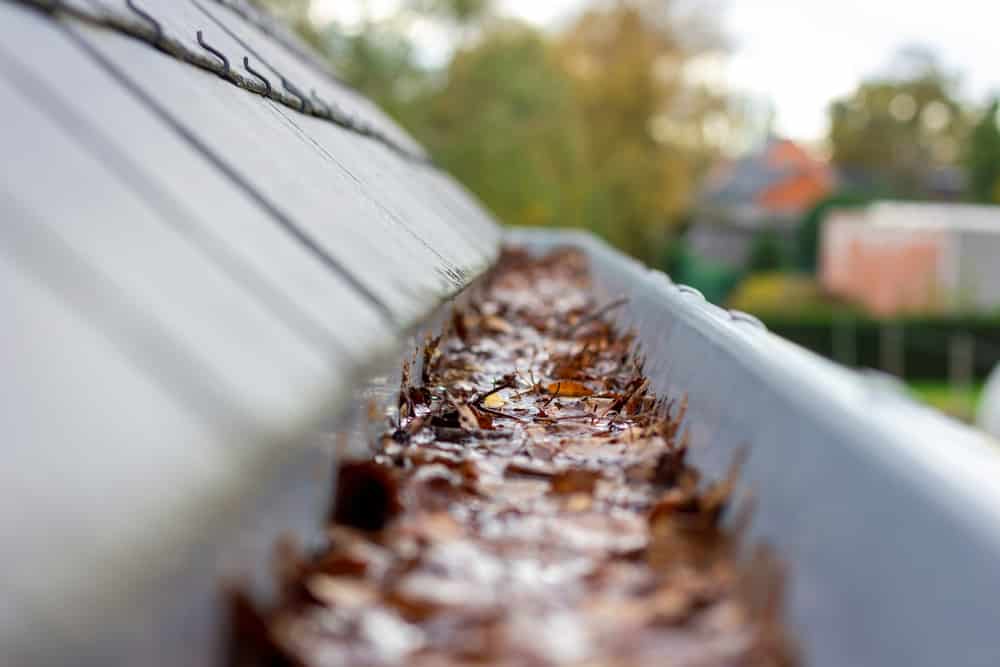
The right tool for the job depends on how much debris there is and how wet and compacted it is.
©Joeri Mostmans/Shutterstock.com
If you don’t have much debris in your gutters, your best bet might be to scoop out what little is there with gloved hands into a bucket. If there’s a lot of loose and relatively dry material in them, a leafblower can blow material two or three yards down the length of the gutter and eventually out at the end to minimize the number of times you have to move your ladder. Soggy and hard-packed material is a job for a power washer or a gutter scoop. If your downspouts are thoroughly clogged, you might need a plumbing snake to clear the blockage. A garden hose can complete the rinse of your gutters and show you that water is flowing freely through the downspouts.
5. While You’re Up There . . .
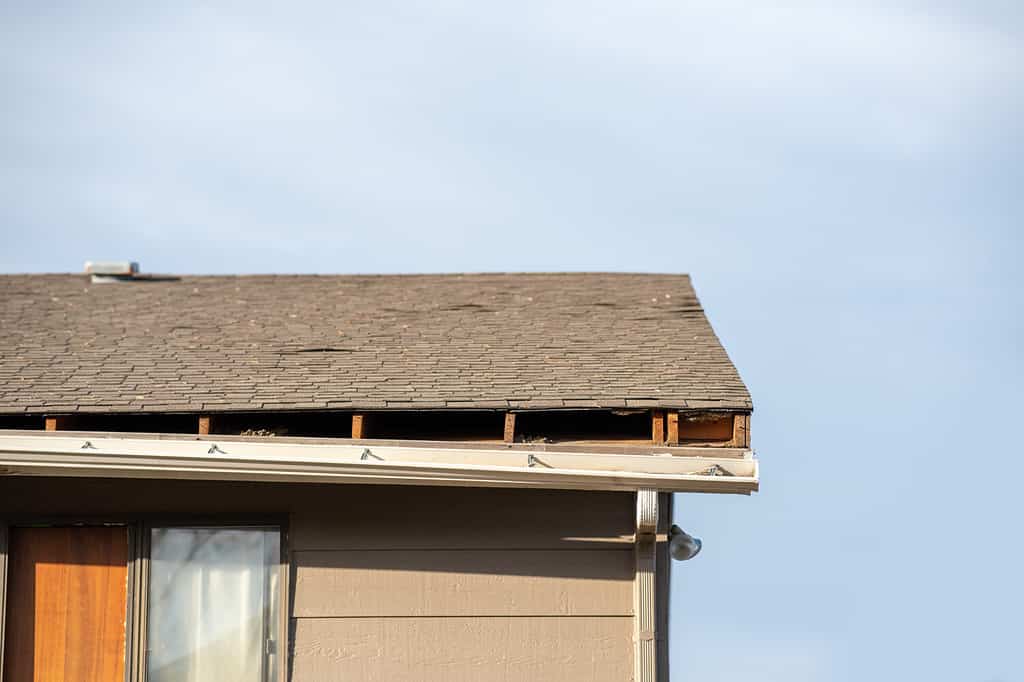
Gutter-cleaning time is also inspect-the-roof-for-damage time and reattach-loose-gutters-time.
©Cameron Trent Way/Shutterstock.com
If you’re going to get this up close and personal with your roof, look it over to notice any loose, worn, or hail-damaged shingles. If there’s been storm damage, your insurance company might buy you a new roof. Take a screwdriver with you and tighten up any places your gutter is starting to pull away from the house. You might also want to trim back small tree limbs hanging over the house if you can do so safely. Look for any signs of damage to the house by wildlife, including cracks or holes that need to be caulked, hornets’ nests getting started, or spots where squirrels may be starting to chew a hole.
What About Gutter Guards?
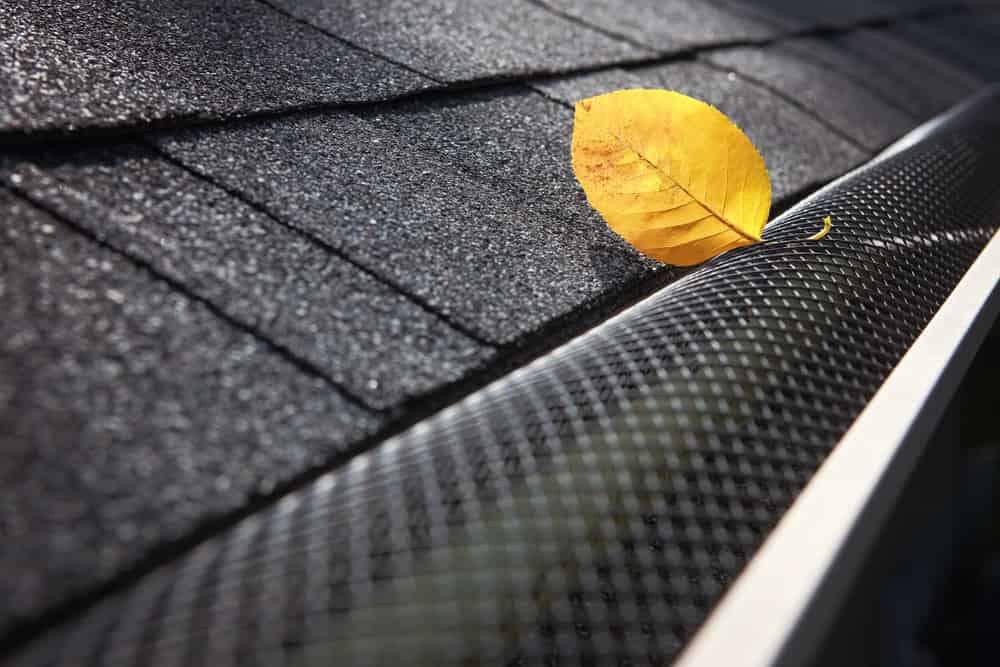
Gutter guards can prevent leaves from getting in and creating clogs.
©Suzanne Tucker/Shutterstock.com
Gutter guards are generally mesh covers made of metal or plastic that prevent leaves, seeds, and sticks from getting into your gutters while allowing rainwater to flow in freely. Seems like a no-brainer, right? Problem solved! Not quite. Some people swear by them, others swear at them. Here are some of the pros and cons of gutter guards:
Pros of Gutter Guards
- Leaves that accumulate on top of gutter guards can dry out and blow away more easily than if they settled into the deep shelter of the gutter itself.
- Gutter guards can help prevent rust, streaking, and staining that can happen from standing water and soggy debris.
- Gutter guards help keep the critters away if they’re installed tightly and maintained.
- They help prevent ice dams by keeping the snowpack elevated out of the gutter itself so that meltwater can keep flowing freely through the gutter system.
Cons of Gutter Guards
- Installation can be expensive. Depending on the type of system an average installation can range from $80-$1,000.
- They only keep out large debris. Small debris can still get through and over time can clog gutters. Debris can also pile up on top of them and need to be removed. Experts say you’ll still need to clean out your gutters twice a year.
- Some gutter guards are designed to slide under roof shingles when they are installed. If your roof is still under warranty, this can void that warranty.
- They dent easily and need maintenance. Weather, wind, and animals can work them loose and create holes and gaps.

Some types of gutter guards can void your home’s roof warranty.
©Victor Yarmolyuk/Shutterstock.com
Get Your Mind Out of the Gutter
Cleaning the gutters on your house is an essential part of home maintenance in most parts of the country. If you get it into your calendar twice a year and budget for it, it’s a chore that can get done routinely and efficiently and remain out of sight and out of mind.
Thank you for reading! Have some feedback for us? Contact the AZ Animals editorial team.








